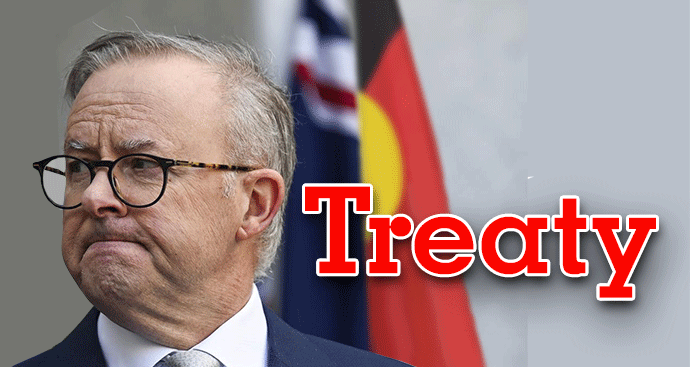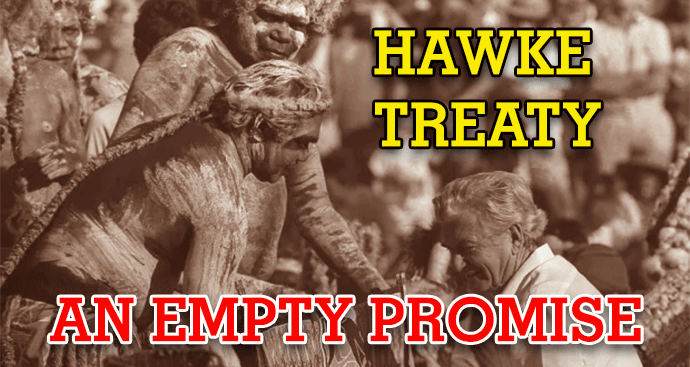Déjà vu: Labor leader avoids Commonwealth Sovereign Treaty Process


3 August 2023
On 2 Aug Patricia Karvelus interviewed PM Albanese on the ABC RN Breakfast program regarding Opposition Leader, Peter Dutton raising the issue of treaty(ies). The PM floundered when asked this question because clearly he is not prepared to deal with this matter. He was clearly happy to pass the issue of treaties off to the states, saying words to the effect, that states are already engaging in the treaty process. Somewhat surprisingly, PM Albanese stressed that the Uluru Statement does not specify that a treaty(ies) is with the Commonwealth, preferring to focus on a Voice to Parliament which has no enforcement provisions.
This raises 2 questions:
Let me address the issue of his reluctance to enter into discussion on the Treaty Process topic.
His apparent back peddling suggests to me, having been down this road before, that the federal government under Albanese appears to be returning to the Crown Solicitors advice to the Department of Aboriginal Affairs (DAA) through Aboriginal Affairs Minister, Peter Baume, that the government should avoid using the word Treaty because of its international connotations,
under the Vienna Convention on the Law of Treaties.
See: 'That Word' Treaty - The Value of Historical Insights'
And so the Fraser government proposal in appointing the Senate Standing Committee on Constitutional and Legal Affairs called Two Hundred Years Later in 1983 [ at aph.gov.au ] wanted to investigate legal options. Included in this inquiry was the direction to at look at a name for such an agreement, other than the name ‘treaty’. The National Aboriginal Conference (NAC) representative came up with a Yolgnu name - Makarratta. But the true definition of Makarratta means that blood has to be spilt in order to settle a dispute. The NAC’s community consultations in the centre of Australia, particularly the Elders at Santa Theresa, were emphatic in their community submission to the NAC that they did not want to be involved in a process called Makarratta, as they understood the literal meaning under First Nations Law and culture. They put it to the NAC that that name should be dropped and return to the word Treaty.
The NAC, prior to being defunded by the Federal government did in fact resolve to return to using the word treaty. This decision was made because the NAC was a nationally-elected organisation from the grassroots and their obligation was not to find policies where the policy is a one-size-fits-all.
The other name suggested by the Two Hundred Years Later Senate Standing Committee on Constitutional and Legal Affairs was a ‘compact’, less than a treaty, an agreement.

Overall, it was very clear that the term Treaty raised enormous alarm for the Australian Government. Not only did the term treaty involve possible international implications, such as the Commonwealth entering into a Treaty under international Law with various independent sovereign First Nations within Australia, but also sovereign treaty process of this kind would denote an absolute right of self-determination and self-government which would be protected by international law and the Vienna Convention on the Law of Treaties 1986, which regulates treaties among sovereign states.
In the end, the Australian Labor party, under the Bob Hawke regime, just simply shut the process down because it became too hard, and the right wing of the Labor party got their way to drop the whole process.
It appears from the ABC RN interview on the morning of 2 August 2023 that PM Albanese has recoiled on this thought, because it has some very serious implications and a Treaty process with the Commonwealth cannot be done without seriously looking at and incorporating into the Treaty process all international human Rights and other Conventions and Covenants, which create a safety net below which a sovereign treaty cannot go, otherwise it is invalid.
As Senator Pat Dodson concluded in the Expert Report on constitutional recognition - it was too hard and the public would not understand. He wrote:
While questions relating to sovereignty are likely to continue to be the subject of debate in the community, including among Aboriginal and Torres Strait Islander people, the Panel does not consider that these questions can be resolved or advanced at this time by inclusion in a constitutional referendum proposal.
Also: Proposed constitutional reforms are treasonous and fraudulent!
The current act of the Albanese government to take a backward step on this call is nothing but a cowardly act to avoid sovereignty-based treaties and he is obviously supportive of State-based treaties, which will not be true treaties. They will merely represent social contracts between the State government and the respective First Nations with whom they enter into agreement.
The Commonwealth government is very well aware that states can only make agreements with First Nations on matters that are permitted by their respective constitutions, which basically means that these State-based so-called ‘treaties’ may not necessarily grant to the First Nations a right of self-determination. One needs to investigate forensically the legal difference between self-management and self-determination.
To go one step further, who is going to fund the terms of the state-based ‘treaties’ for the agreed terms to be acted upon and enforced? What type of enforcement mechanisms will be implemented in these State-based treaties?
As I wrote 23 December 2019:
So don't be tricked into the quasi-Treaty process the Australian States are rushing to implement. We must ask: How come they are so keen to negotiate? The fact is they are protecting the Commonwealth, as in reality it is only the Commonwealth and/or the Crown that can enter into sovereign treaties. This was spelt out in the Victorian Government Fact Sheet on treaties several years ago, but seems to have been forgotten, amely:
There are three main limitations on treaties in Victoria:
- The parties must agree on what is necessary and just.
- As a state within the Commonwealth, the Victorian Government can only agree to what is within its own constitutional powers.
- As one state within the Federation, Victoria can only advocate for what is included in a national treaty.'
[Victorian Government Treaty Fact Sheet]
From now on our Peoples at the grassroots will need to have experienced legal representation on treaty-making and human rights. If they do not have made available legal experts in the area of treaty-making and international law, the danger may be that they are just negotiating another form of an ILUA, Indigenous Land Use Agreement, in which the state holds all the power and the cards are stacked against the inherent rights of First Nations Peoples.
One would expect that the first port of call at the state or federal levels is: What is the Crown prepared to give up? If you are negotiating a proper treaty, then everything should be on the table for negotiations.
The first thing I would warn our people who are volunteering to negotiate state-based so-called treaties is to ensure that the Crown also places all their cards on the table. If this is not done, then what they are doing at the state level fails.
Our Peoples have a right to expect the Crown will give up some of its claims and to negotiate in a proper manner, which includes the relinquishing the Crown’s claim of sovereignty, that is government over all of us in this country; sharing in the natural wealth of the Country - that is everything that comes from our lands; water ownership; and having governing control within our own territories, which goes much further than a Voice to Parliament.
When we think about these few matters, one begins to understand why PM Albanese seeks to avoid any discussion of treaty process at a national level. For me, It’s déjà vu from the 1980s.
 Contact: Ghillar Michael Anderson
Contact: Ghillar Michael AndersonConvenor of the Sovereign Union,
Head of State of the Euahlayi Peoples Republic
Contact Details here

